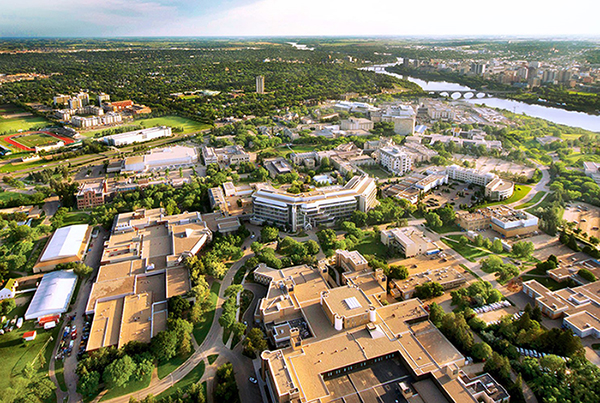
Today’s Universities and the Democratic Order
General Academic Assembly 2025 State of the University Address
By Peter StoicheffThe list of these global challenges is sobering and now recitable – climate change, a pandemic, energy transition, nationless populations of millions on the move, extreme income disparities, disruption of the world economic order, healthcare inadequacies, food and water insecurity, intractable military conflicts, political polarization, increasing autocratization, diminishing democratization, and more – further destabilized by the unknown effects of AI and of other geopolitical uncertainties. I’ve heard this list termed a “polycrisis” in a world described as “shock-prone.” Its potentially unresolvable features are implied in a parallel term, “permacrisis.”*
*“shock-prone” is Governor of the Bank of Canada, Tiff Macklem’s term from a December 2024 year-end speech. “Polycrisis” was originally coined by Edgar Morin and Anne Brigitte Kern in their 1999 book, Homeland Earth.
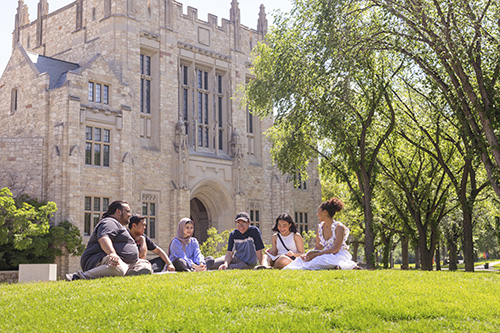
The University of Saskatchewan supplies the majority of the doctors, nurses, pharmacists, lawyers, engineers, teachers, veterinarians, and business leaders (to name only a few of the professions we offer degrees in) that every community in this province relies on. From the farm trains of the Great Depression to the Crop Development Centre, College of Agriculture and Bioresources, the Western College of Veterinary Medicine, VIDO, the College of Engineering, the Edwards School of Business, and the Global Institute for Food Security today, we have supplied a majority of the agricultural talent necessary to keep this province at the forefront of productivity. We’ve supplied political leaders – from nine premiers and a prime minister, to ambassadors, to Indigenous leaders, to Lt. Governors of this province and of others. We’ve had a total of 77 Rhodes Scholars during our history, including five over the last three years, a reflection of the high quality of our teaching and of our students, who are competitive with the best in the world. Our recent research income growth outstrips proportionately any other university in the country – an achievement in itself, but yet another way we are able to attract, retain, and graduate talented people. We attract increasing numbers of students to our university each year at the undergraduate and graduate levels. And we are on the cusp of successfully completing a $500M Comprehensive Campaign, the largest this province has ever seen and an indication that the talent we produce is recognized and valued.
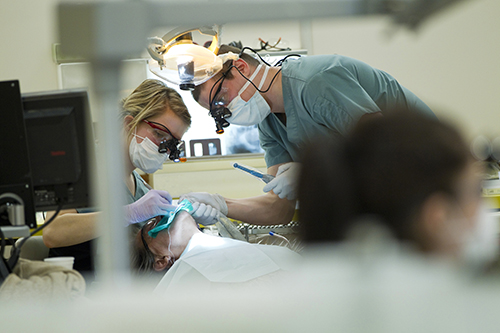
*U15 Canada, “Developing Talent: Canada’s Leading Research Universities and How We Close the Talent Gap”, Nov. 2024.p.2.
Innovation, both social and technological, relies heavily on the talent we educate, graduate and prepare for our workforces. Research-intensive universities such as ours are pivotal in closing these talent gaps, serving as hubs for collaboration with industry, innovators and entrepreneurs.
At our university we have students from over 130 countries around the world, and alumni in over 170. If we add up the number of alumni around the world educated by the signatories of the Berlin Statement, we’re in the millions. As we work together as research-intensive university organizations, that global reach in a shock-prone “polycrisis” era is an opportunity jewel of inestimable value.
Our contribution to this kind of talent isn’t only professionally targeted and aligned. At our best, we develop and encourage the creative, self-reflective and ethical thinking that makes societies sustainable and just. This speaks to the central role the social sciences and humanities, not only the STEM subjects, play in achieving our societal impact. I have argued in previous GAA speeches over the years for the importance of the social sciences and humanities, and particularly in a post-COVID world. I won’t repeat those arguments here. But suffice it to say that what slowed and compromised recovery from the pandemic was not an absence of vaccines – science had produced them -- but the fact that the world lacked what the humanities and social sciences provide: a collective understanding of the political, religious, philosophical, historical, linguistic, policy-related and other realities key to ensuring global human health. I have also argued that the human skills of communication, creativity, ethics and empathy are the foundation for a democratic order.
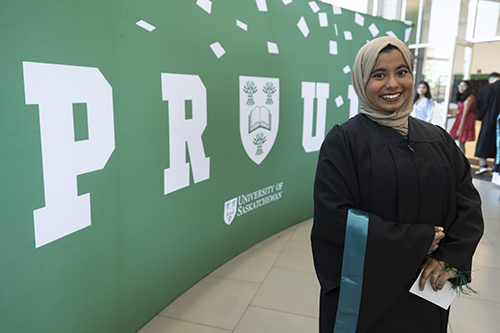
Highly qualified talent of the graduate degree kind also drives entrepreneurship and innovation. Half of Canada’s tech startup founders hold advanced degrees, and half of those have PhDs. Ten per cent of Canadian unicorn startup founders hold a PhD. Seventy percent of new PhD holders in Canada now enter industry – a decade ago fewer than half did, the majority back then returning to academia. The top five IP producers in Canada are universities. National productivity and innovation aren’t merely improved by the talent our research institutions graduate – they’re utterly dependent on it.
*SSHRC 61%, NSERC 69%, CIHR 91%, CFI 80% (U15 Canada figures).

Curiosity-driven research is a big part of this value proposition. Solutions to the polycrisis are urgent, but in the end they will be the accumulation of generations of inquiry conducted without its utility in mind at the time.
In each of these respects, the University of Saskatchewan brings tremendous value to the province and far beyond it. I thank all of you here – students, staff, faculty, postdocs and others, for contributing to this success. Research-intensive universities like ours strengthen their respective societies measurably and consequentially. Their influence extends from driving innovative economies to supplying professional talent to building and protecting democratic systems. More about that in a minute.
We are, though, in a time of uncertainty that is distracting public opinion and political will from the value of our universities, in Canada and in many countries around the world. The value of universities is being reappraised and, increasingly, diminished and attacked. As a result, the ability of universities to contribute solutions to the challenges the world now faces is being severely weakened.
Public opinion regarding universities can be assessed in many ways. One, in this country, is an annual survey conducted by Universities Canada by Abacus that measures the value Canadians believe our universities hold for them. That survey has been going on for a decade, and the level of public approval for universities during that time has declined year after year from an approximately 80% rate to just over 50% now. Although the situation in Canada is not as severe as it is in the U.S., I would nevertheless characterize it as an emerging crisis of trust by Canadians in their universities. We would be foolish not to take it seriously now, and we’d be foolish not to read the U.S. tea leaves and learn from them. It would take more than this address to offer a comprehensive set of arguments for why that emerging crisis of trust here is occurring, but I can offer a few thoughts on this important matter.
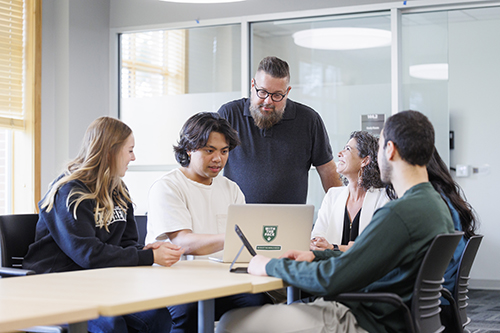
One is that for many Canadians the future feels uncertain and elusive, and universities are not seen to be engaged with this or with many of the largest challenges people are experiencing today. The reversal of a social contract long held to be in place until recently is an example of that – the promise that the next generation will enjoy a life of prosperity and opportunity that is an improvement upon our own. That contract has been fulfilled for many generations until now. The unaffordability of housing is a symptom of that, and there are many others. In other words, universities are being seen as elitist and disengaged from what matters most to Canadians.
Another is that universities have become institutions that talk of supporting free speech while nevertheless being seen to prevent it – talking the talk of diverse perspectives and freedom of speech without actually walking it. As the Wall Street Journal wrote recently, “over time too many universities have become intellectual monocultures that refuse to allow alternative points of view.” We may not like it, but universities are increasingly regarded that way here, in the U.S. and elsewhere. I’ll return to these public perceptions later.

Political support for universities has also declined in the past decade in most western countries. This is evidenced by an almost universal decrease in government funding levels, and by politicized attacks on universities’ autonomy and research as well.
If merely the past fifteen months are any indication, beginning with the Congressional testimonies by three of our U.S. university president colleagues a year ago this past January, and continuing through to what is occurring now in the U.S. and elsewhere, we’re in the eye of a storm we’ve not seen the likes of before. That storm is hitting evidence-based decision-making; it is hitting research; it is hitting universities; it is hitting free speech; and it is hitting many fundamentals of a liberal-democratic order that we are critical in supporting. Political over-reach into universities that compromises their autonomy, and much else, is but one example of the challenges now faced by universities, and they stretch far beyond the U.S.
Commentary in India on that country’s universities, so important for student enrolments and talent attraction in Canada and many others, observes that they “are beset by multiple crises – a financial crunch at the university level, a deficit in research opportunities for faculty, poor infrastructure and learning outcomes for students; with any protests hit hard by police brutality and campus repression.”*
Universities in England are “facing a ‘tipping point’ … engulfing some of them in financial crisis, according to vice-chancellors [there].”* Norway is proposing major cuts to the sector’s research and internationalization efforts. As one commentator there recently put it, *“Higher education and research are, unfortunately, not understood as decisive areas for national strategic long-term investment.”*
*Feroze Varun Ghandi, “The Multiple Crises in Indian Universities”, in The Hindu, May 9, 2022.
*Richard Adams, “English Universities Face Autumn ‘Tipping Point’ as Financial Crisis Looms” in The Guardian, Aug 9, 2024.
*Jan Petter Myklebust, “Anger over proposed cuts to HE, research, and education aid” University World News, October 11, 2024.
The European University Association (EUA) conducted a survey of its more than 900 university members for trends they’ve experienced over the last five years. One of the top challenges is “underfunding, at a time when higher education institutions face increased responsibilities to respond to multiple changes and challenges in their environment. Forty-four per cent of institutions report either continuously low or decreasing funding over the past five years, while 70% of higher education institutions identify underfunding as one of the top three obstacles for improving learning and teaching.”*
In Japan, another of the Berlin Statement signatories, the majority of private universities have missed their quotas for new enrollments, and are having to respond by opening overseas branch campuses.*
*Michael Gaebel and Therese Zhang, in the EUA (European University Association) “European Higher Education Institutions in Times of Transition” July 25, 2024.
*John Ross, “Japan Moves Cautiously on Overseas Branch Campuses”. THE Sept. 16, 2024.

Provincial tuition freezes and cuts, combined with recent federal policies that severely reduce the number of international students the entire Canadian postsecondary sector can accept, have thrown many universities in this country into a state of financial crisis.
If the Conservative Party forms the next federal government, it will put “an end to the imposition of woke ideology in the federal civil service and in the allocation of federal funds for university research.” According to its party platform, freedom of expression policies that align with the party’s values will be a requirement for universities in order to receive federal research funding. Some Canadian provinces already have made similar moves.*
*University Affairs, April 1, 2025.
We’ve been immune to much of this in Saskatchewan. The University of Saskatchewan is aligned with the provincial growth plan in many key ways. Our research is recognized as an important contribution to the province’s future prosperity. Our recent leap in the rankings is understood, and the quality of our programming and of our students is acknowledged. This, again, is due to the good work of all of you here today. As a result of that confidence in us, our provincial government has not encroached on our autonomy in ways we see in many other provinces, and our operating funding has remained stable.
At the federal level, however, Canada’s recently imposed international student visa policy has damaged university finances and impaired campus diversity. It has had the added drawback of erroneously signalling to the rest of the world that Canada is no longer interested in attracting foreign talent at exactly the time when international collaboration and exchange are more necessary than ever. The effects are already being felt – Canadian universities’ international enrolments have dropped, many critically.
But nothing compares to the viciousness of attacks on universities, and education in general, in the United States. Political leaders there have stated that “If any of us want to do the things that we want to do for our country …we have to … attack the universities” and that universities are “the enemy within,” “dominated by Marxist maniacs and lunatics.” Florida’s “Stop WOKE Act” and insistence that university faculty align their “speech” with the state’s, the proposed amendments to the 1965 Higher Education Act, governments populating university boards with political loyalists, appointing ideologically compliant university presidents, and influencing faculty hiring -- all take a page from a “playbook found in autocratic nations and illiberal autocracies” jeopardizing academic freedom and institutional autonomy.* The recent funding cuts to the NIH and other U.S. research agencies will require years if not decades to recover from. Those cuts are being connected to any research perceived as associated with everything from communism to socialism, from gender identity to climate action, from EDI to the U.N. and the W.H.O. Similarly the cuts in the billions of dollars, occurring by the day at the time of this speech, to prestigious universities such as Columbia, Cornell, Harvard, Northwestern and others., under the guise of correcting anti-Semitism. In the process, the democratic order there, and in many other countries, is being imperilled.
*John Aubrey Douglass, “Universities Can Expect a Frontal Attack if Trump Returns”, University World News, Oct 30, 2024. Informed predictions in late 2024 of a Trump second term included concerns of cuts to funding of the National Institutes of Health (NIH), NSF, the Department of Energy, NASA, the Environmental Protection Agency and the Centers for Disease Control and Prevention, and the National Endowment for the Humanities. By the time of delivering this speech, most of these predictions have proved accurate. See also Kim Lane Scheppele and Norman Eisen, NYT Opinion, Friday January 17, 2025, “Are We Sleepwalking Into Autocracy?”: “Defenders of democracy will have to stay united, focusing on ensuring that checks and balances remain intact and that crucial democratic watchdog institutions elude capture. Otherwise, America will indeed find itself sleepwalking into autocracy.”
The many challenges to democratic systems we are seeing now are not entirely new, but they are worrying, and they are a trend. What’s different now, though, is that the university influence that can be the antidote to this destruction of the democratic order is itself being assailed on a broad scale.
*The values enshrined in Article 2 of the EU Treaties including “democracy, equality and the rule of law” have been reduced in Hungary according to its own parliament. Russia is no longer the constitutional democracy it declared itself to be in 1993. India has seen recent deteriorations of its own democratic values: “Attacks on academics and the suppression of student protests may intensify under Indonesia’s new leader” according to the THE in November 2024.[i] Bangladesh massacred civilians, mostly university students, in the summer of 2024, in response to anti-government protests, revealing its autocratisation – and the positive influence of a new caretaker government there remains to be seen. France’s December 2024 non-confidence vote against the government of Prime Minister Michel Barnier “show[ed] how the eurozone’s second-biggest economy risks becoming ungovernable” and that “the growing fragmentation and polarization of France’s political ranks are testing the foundations of its democracy.”
One of the ways universities strengthen society is by continuing to be participants in the on-going experiment of democracy, and by helping societies not let their guard down as their democratic orders become imperilled. There is a correlation between education and democratic behaviour. Our universities ensure this by being venues for open debate and dialogue that, because we are universities, and moreover research universities, are both current and informed. Teaching students, and each other, how to think, not what to think; and providing the space for opposing views, even polarized arguments (as opposed to just opinions or rumours), to be civilly expressed and authentically heard, is perhaps the biggest benefit our universities can offer societies – it’s the foundation of social cohesion and by extension of democracy, as Daniels writes.
*Ronald Daniels, What Universities Owe Democracy, p. x.
Our role in that is made all the more urgent by the social media cloud of disinformation that obscures facts, and by the current demise of reliable, informed, impartial, circulated and authoritative media analysis, not just in autocratizing countries, but in Canada as well. But that is another talk.
What do we need to do at this university to help ensure our impact remains as strong as it currently is, our value appreciated, our work protected from political interference and over-reach, so that we can continue to support democratic nation-building?
We are in an enviable position at this time at this university. Our relations with all levels of government are very strong. Our Comprehensive Campaign success to date tells us we have a lot of alumni and public support. We have not allowed ourselves to be overexposed to the international student market, and therefore are not struggling as much as many other universities are with the international visa cap challenge (though we are not immune from its consequences either, I hasten to add). We have risen dramatically in international rankings and I believe are destined to rise much more in the coming years. Our international profile is very strong – in places it is extremely so, such as in Germany, Singapore, India and south-east Asia. We are a highly visible member of and leader within U15 Canada and Universities Canada. Our community-engaged research, and our research in many areas aligns with features of the polycrisis I outlined earlier, including in vaccines, and in water and food security. We are leaders, not bystanders in Canada’s Reconciliation efforts, and are seen to be.
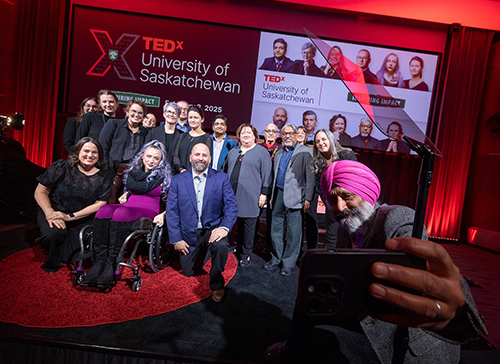
Given all the opportunity we have at this point, the product of great effort, of strategic effort, and of a highly dedicated university community, it is a good idea to take stock of where our strengths are and identify how we can ensure our impact is valued and understood. In closing, I offer six imperatives for the University of Saskatchewan community.
One is for all of us to make the value proposition with which I began this talk. It’s my job to do it, and it is the main thing a president should be doing. We have a strong communications team that is pushing these messages out all the time in many different media and platforms. But faculty, students, alumni and other members of the university community can do so as well. We may have differences of opinion about the state of the university at times, but those differences (inevitable at any university at any time) pale in comparison to the challenges universities are facing now, around which we need to collect together.
The facts of that value proposition evolve, and they are captured accurately in our Discovery Digest you receive each month, in the Green & White, in the many media releases that are continually updated on our homepage, and in our extensive social media output. We are currently in the process, at the U15 and here at the University of Saskatchewan, of enlisting third-party supporters in industry as well, so that it is not only all of us making these arguments on behalf of our own university but others as well.
Another imperative is to continue the work we’ve been doing on being an outward-facing university. Although we might not always be aware of it, we are recognized for our “Be What the World Needs” identity. We do a lot in that regard – one of the themes of my previous nine GAA addresses has been the impact that we have locally, provincially, nationally and in select ways, globally. This is the result of conscious effort, of thinking big, of having a vision and staying with it, of being confident – it doesn’t just happen by chance. It’s one of the reasons why our Be What the World Needs Comprehensive Campaign has been successful – many people and organizations understand how we are creating positive impact and they want to support that work.
We can do more in this respect. We need to be aware of what is top of mind for the Greater Saskatoon Chamber of Commerce, the Saskatchewan Chamber of Commerce, the Canadian Chamber of Commerce, the Business Council of Canada. Of what is top of mind for employers seeking to hire our graduates, and of the public in this province and beyond. Of the fact that Canada urgently needs practical public policy solutions to the global economic instability unfolding before us now. How are we addressing the demise of that social contract I spoke of earlier? Are we offering solutions to the opioid crisis? Are we asking ourselves how a university such as ours can help solve Canada’s productivity challenges? Homelessness? Some of the answers lie in the research we choose to do, and our community-engaged research is both impressive and high-impact. Many of the answers lie in being creative, responsive, swift and engaged in our degree programming design and choices. Universities like ours are best positioned to take this on, but must do more of it, and we must be seen to be doing so.
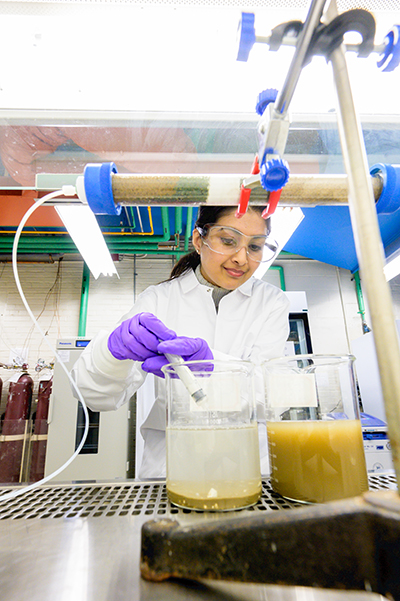
A third imperative is to ensure we speak to all people in what is a politically and geographically divided province and country. In the last provincial election, with the exception of only three seats, Regina and Saskatoon voted NDP and the rural ridings SaskParty. We are not the University of Saskatoon, however – we are the University of Saskatchewan, with national and international reach and influence. Some parts of our university are very much aligned with that and have been for a long time. We have Nursing programming in many places throughout the province. We hold veterinary clinics in the north. Dentistry clinics as well. We have our Prince Albert Campus. We offer full medical programming in Regina. Our Canadian Centre for Rural and Agricultural Health reaches across the province. Our Board of Governors will be holding more of its meetings in communities outside of Saskatoon. Our Huskies brand is known everywhere. But we must continue to amplify our reach and our relevance to ensure we speak to and for the people of the entire province and far beyond.
A fourth is to ensure we increase our efforts on this university’s Innovation and Entrepreneurship priority. I’ve spoken about this in several GAA addresses before, so won’t go into the details again. But suffice it to say that Saskatoon is one of the fastest-growing high-tech hubs in Canada, and home to a disproportionately large number of successful startups, most started by our alumni and with workforces comprised of our alumni. We contribute to this innovation ecosystem, that is, but we can be even more intentional about that. Recently we have done more, including the creation of OPUS, making good on our goal of substantial work-integrated learning opportunities in our UPlan 2025+, and supporting the priority we have given to innovation and entrepreneurship. There is planning underway to propose an innovation and entrepreneurship centre in the Edwards School of Business that would reach across the university. I hope it is successful. And we have helped drive the relocation of Saskatchewan Polytech’s Saskatoon campus to Innovation Place. This will be a huge opportunity to model a new vision for postsecondary innovation impact.
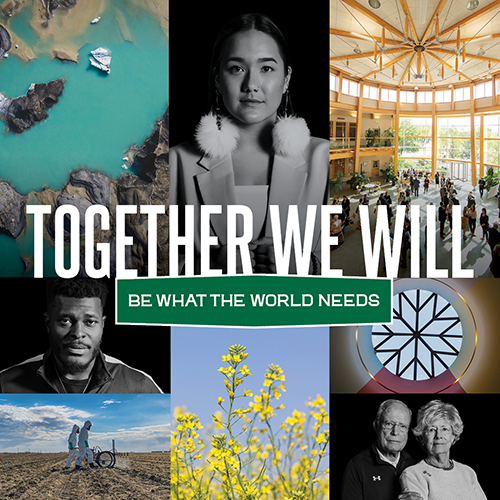
A fifth imperative is fundraising and alumni engagement. We have shown we can do these at a very high level. I have no doubt we will announce in June, at the end of our $500M Comprehensive Campaign, that we have not just met, but exceeded, that ambitious goal. Government funding at all levels is not going to increase substantially in the future. A new federal government of whatever party is going to have to make hard financial decisions that likely will not see research support, or a reversal of the international visa caps, become priorities any time soon. We are not about to raise tuition beyond what is permitted in our MoU with the province, nor would we want to; we are committed to accessibility as one of our tuition planning principles. This leaves fundraising as a significant financial frontier for us. We need to adjust our sights and our culture so that we embrace it responsibly, and remain as ambitious as we have been in recent years, with a goal of $60M annually as opposed to the $14M or so when I began in this position. All parts of the university, and all members of the university, need to wrap themselves around the need for this, and contribute to its success.
*NYT editorial March 15, 2025.
*“Recognizing the humanity and inherent rights of all is not, as EDI detractors insist, some radical doctrine. It is a legal requirement and should be the minimum expectation within all organizations, irrespective of political headwinds.” Saroo Sharda and Clare Warner, “Beyond the Binary: Reclaiming Equity and Inclusion in Higher Education”, University Affairs, April 1, 2025.
Within the context of the turbulence and damage being experienced by universities in Canada and elsewhere, we are in an enviable position at the University of Saskatchewan. We do not need to reinvent ourselves, as other universities may well need to do, particularly in the U.S. But we cannot ignore the warning signs that I’ve identified here. Nor can we ignore the role we play, alongside other universities, in building democracy. That’s why I am emphasizing the advantages we have that we must focus on right away. We have shown, as a university community, that we can excel through a number of different challenging periods – including a pandemic, and the historic financial challenges of 2016, to name two in only the last decade. Through it all, we continue to meet our aspiration of being the university the world needs. Right now, the world does need strong and sustainable universities, and research-intensive ones such as ours, to ensure the democratic order prevails. We are in the best position to model the way forward in that regard, but we need to be intentional, together, in achieving that goal.

